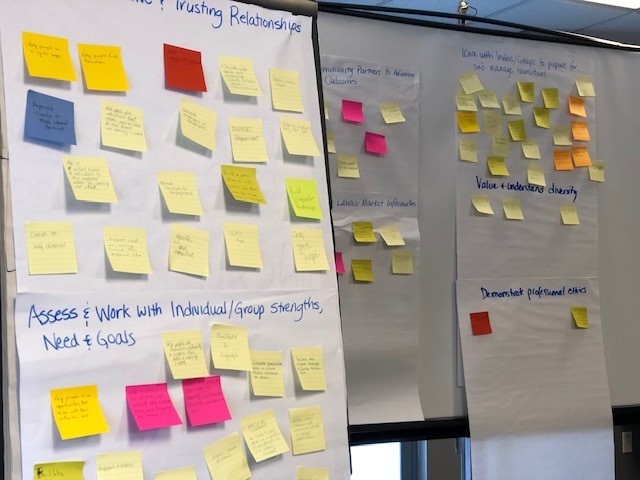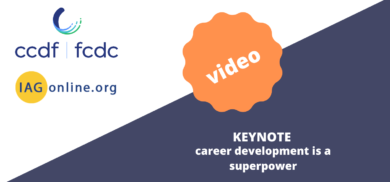Together, we can develop a strong evidence base.

CCDF believes that who you directly involve in the research has a lot to do with how well the findings are implemented into practice. CCDF’s research projects are conducted in partnership with front-line practitioners working with real clients and/or directly with people who are the subject of the research. Our research protocols have been consistently guided by the following principles:
- New interventions/programs/service delivery models must reflect front-line realities and practices or they will never be adopted into longer-term practice, regardless of results;
- Full engagement and buy in of research partners is essential. This includes front-line practitioners, their clients, their supervisors and management in career service settings. In education settings, this includes students and those that have left school prior to graduation, teachers, guidance counsellors, principals, government officials, employers, and community members. We are mindful in any research project to actively seek out and include under-represented voices;
- Involvement in a research project is a professional and organizational development opportunity that benefits clients, professionals, educators and management and supervisors.

Working with those on the front-lines results in outcomes that are grounded in reality and informs practice moving forward.
Our research

Evidence-Based Employment Services: Common Indicators
Key Researchers:
This study was conducted in two phases:
- The first study (Phase I: 2011-2013) tested a new online data gathering tool titled PRIME (Performance Recording Instrument for Meaningful Evaluation) and demonstrated an ability to track common indicators across divergent settings and these “made sense” to all participating practitioners. It also began to uncover apparent predictors of positive employment outcomes including positive changes in learning and skill acquisition, changes in personal attributes and individual traits such as taking personal responsibility for progress. The first study provided a positive start toward addressing the core question: What kinds of interventions (programs/services) with what profiles of client characteristics and in what contexts are associated with what kinds of outcomes?
- The second study (Phase II: 2013-15) refined measures; made PRIME more efficient and easy to use; extended the client service period; examined many of the same relationships as Phase I; and added new areas of exploration, such as the types of interventions practitioners use with clients and testing of a self-help index.
Career Education in Atlantic Canada: Research and Recommendations
Key Researchers:
CCDF conducted research and provided recommendations on the socio-economic imperatives for action in the area of career development, an environmental scan of successful programs in Atlantic Canada, and a compilation of international best practices. From this research CCDF developed recommendations that we integrated into CAMET’s Future in Focus – Atlantic Career Development Framework for Public Education.
Assessing the Impact of Career Development Resources and Practitioner Support Across the Employability Dimensions
Key Researchers:
This project aimed to answer the following research question: If clients are given a comprehensive needs assessment to determine their employability need(s), what is the differential effect of “practitioner-launched” and “practitioner launched and supported” use of career resources on clients who are weakly attached to the labour market versus those who are more strongly attached.
The project used a participant-research approach in which real practitioners implemented research protocols and gathered data from typical clients with diverse employability needs across a variety of populations.
State of Practice: Essential Skills Applications with First Nations, Inuit and Métis in Canada
Key Researchers:
This literature was produced for CCDF’s First Nations, Inuit and Métis Essential Skills Inventory Project. The purpose of the literature review was to describe the current level of need for Essential Skill development among First Nations, Inuit and Métis, to explore the state of practice of Essential Skills initiatives with these populations in Canada and to examine innovative practices in an effort to determine potential “markers of excellence” in ES programming.
Transitioning Graduates to Work: Improving the Labour Market Success of Poorly Integrated New Entrants (PINEs) in Canada
Key Researchers:
This research report focuses on a growing group of un- and underemployed youth, Poorly Integrated New Entrants (PINEs). PINEs are young people who often have qualifications (diplomas or degrees); but who frequently go back and forth between temporary jobs, unemployment and/or inactivity, even during periods of strong economic growth (OECD, 2010). The report examines what the literature says about them and their barriers to labour market attachment from a global and Canadian perspective. It investigates what works in terms of policies and programs to mitigate their growth, includes a preliminary inventory of national and international programs and policies that target those who are or who are at-risk of becoming PINEs and, finally, provides an analysis of the inventory leading to the development of policy and program recommendations to stem the growth of PINEs in Canada.








